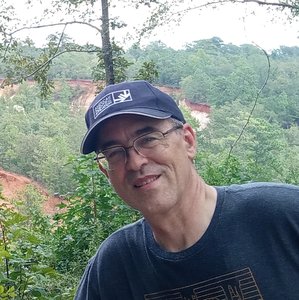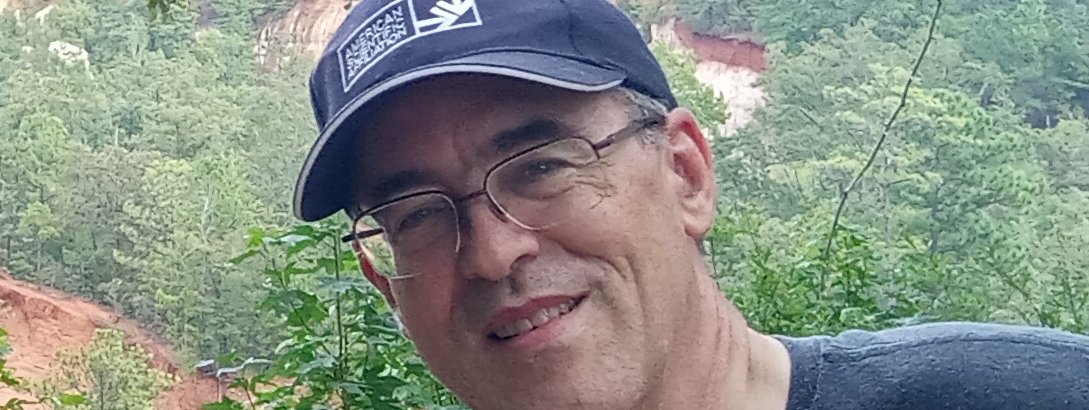BSc 1982 - Mathematics (University of Waterloo)
MSc 1986 - Physics (University of Toronto)
PhD 1991 - Physics (University of Toronto)

Randall focused on Applied Mathematics during his undergraduate studies at the University of Waterloo, establishing a strong foundation needed for theoretical research in Physics. Randall's research during his time in graduate school at U of T looked at theories of gravitation and high-energy particle physics, with a particular interest in superstrings since he was fascinated by the idea that particles are not points.
In 1990, Randall started working with Atomic Energy of Canada Limited (AECL) and was trained to work with CANDU nuclear reactor physics. (The division he had joined is now part of AtkinsRéalis.) He later expanded that to include engineering quality assurance and eventually became a lead nuclear engineering auditor.
How did your time at the university shape your career aspirations?
The technical topics that I studied in university provided an excellent background to understand nuclear reactor core physics. More generally, I was eager to learn, and the university had helped me develop logical, organized, and systematic thinking, which became critical for my professional success. Originally, I had intended to stay in academia. However, toward the end of the PhD program I reassessed my goals and decided to change to industrial work. I started to look for a job that would fit well with my academic background, would provide opportunities to learn new and interesting things, and would accommodate my analysis interest and approach.
What career path did you pursue after graduating from U of T?
I found commercial work in the CANDU nuclear engineering industry. Over a period of 32 years, I successfully contributed to reactor physics analysis and engineering quality assurance before I retired in 2022 to revisit academic interests.
What are some of your fondest memories from your time at the university?
My best memories from the University of Toronto relate to colleagues who became friends. For example, one of my undergrad roommates also became a peer at the University of Toronto. A brilliant colleague, he seemed to always challenge and inspire me academically while being there as a friend during the ups and downs of grad school. I recall getting excited in the 1980s as I sent my very first network message (we didn’t call it e-mail at the time), watching it bounce from server to server around the globe, dreaming of a day when we could interactively share graphics online. I practically lived in my office on the 11th floor of the McLennan building. From there I could see the Harbourfront fireworks, hear the CNE airshows (while trying to study) and even see across to the other side of Lake Ontario on a clear day. I would hob-nob with the other graduate students and even watch them play Dungeons and Dragons (apparently there are similarities with particle interactions in that game). The post-docs and faculty seemed always more than happy to help me where they could, and I also contributed where possible. My favourite faculty antic was when Professor John Moffat showed up on Halloween to teach his post-graduate class – wearing an Einstein mask! In a real sense, I felt that like I was part of a family in the physics building, even beyond the confines of the 11th floor of the McLennan building.
Are there any specific professors or courses that had a significant impact on your career choice?
Regarding my career change from academia, I am thankful for the input of Professor John Moffatt and his former students Dr. Robert Mann and Dr. Martin Green (who was also doing some work for Ontario Hydro at the time), as well as Professor David Rowe from nuclear physics. Also, Professor David Bailey’s experimental physics course showed me that non-theoretical work is interesting and exciting, and this provided me with some confidence in moving out of a theoretical career. I was thankful to find industrial work reasonably close to my area of study. However, my career-change decision was relatively sudden and triggered by other factors.
What challenges did you face as you transitioned from university to the professional world? How did you overcome those challenges, and what did you learn from them?
My transition to industry required significant job-hunt effort. To meet my needs, I found work in collections while waiting to hear back from prospective employers. Once I obtained a job with AECL, my main challenge was to “get up to speed” with the rest of the reactor physics team while finishing my PhD and getting married. This involved reading, training, testing, and asking too many questions! I learned that both persistence and humility pay off in a professional environment (and in finding a spouse).
What advice would you give to current students who are studying in your field? Are there specific skills or experiences you recommend they focus on to enhance their future prospects?
If you are a student who dreams of uncovering something new and exciting, my advice is to take advantage of the time that you have now to do the digging. Like me, you may come to a point in your research where you feel pulled away from academia. For those who may consider a transition into commercial work, I advise developing a work ethic of humility and cooperation in combination with confidence and assertiveness.
I have found that a good commercial reputation is built on great internal teamwork. A physics graduate who takes an industrial job such as doing nuclear reactor physics analysis, will find the physics to be deeply entrenched within an engineering framework. The pure physics of the current generation of operating nuclear reactors was established decades ago, so a starting applied-physics worker must learn not only the strict controls of engineering but also how to thrive within them. Coming from pure physics, I developed an overarching desire for safety that helped me with this. If you are a physics student considering such a transition, I recommend that you take a few engineering courses and take every opportunity to build software engineering experience.
Have you been involved with the university since graduation, such as through alumni associations or mentorship programs?
Over the last several years I have had the privilege to be involved with the University of Toronto Physics Mentorship Program, using my industry experience to encourage undergraduate physics students in their career decisions. I also supported the U of T Computer Science department in the Level Up Showcase event last year. I saw that the students involved were excited and inspired to excellence through these activities. I encourage greater public investment in U of T activities like these!
Can you share your perspective on current trends or developments in your industry?
Outside normal life-cycle activities for operating CANDU designs, the Canadian nuclear reactor industry seems to be moving in at least three exciting directions: refurbishment of operating CANDU reactors, initial construction of Small Modular Reactors (SMRs), and design of next-generation reactors such as the AtkinsRéalis CANDU MONARK design. Engineering and physics for this industry strongly depends on well-established and reliable software, however, there is some movement toward introducing AI techniques. I would be comfortable with AI methods for nuclear reactor design and operations if they are as reliable as corresponding non-AI methods (e.g., learning never decreases accuracy) and if they met the same reliability standards. Scientific and engineering software is very tightly controlled in the nuclear industry!
Looking back, what do you consider to be the most valuable aspect of your university experience?
Being able to carry out my post-graduate studies at the University of Toronto was a dream come true for me. I learned how to understand our highly mechanistic physical universe, and this was invaluable to my later activities in an engineering work environment. However, I also learned there was more to life than physics. For example, my personal Christian tradition and belief in God was solidified and over the years that helped me to not just do my work, but to thrive in it.
I am grateful to have had access to the university’s resources – but even more than that I am privileged to have had the opportunity to work under people whom I consider great physicists, including Professors John Moffatt and Robert Mann, as well as the late Professor David Rowe. They helped me reach a degree of research satisfaction beyond my expectations. If you have opportunity to work with a masterful ‘out-of-the-box’ physicist, that is something you can treasure for the rest of your life!

